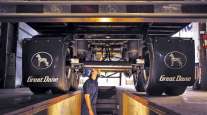Senior Reporter
Thousands More Trailer Orders in February Amid Jammed Backlog

U.S. trailer orders keep on coming and hit the mid-20,000s in February, contending for positions in an already lengthy backlog, analysts reported.
ACT Research, calculating preliminary net orders, put the volume at 23,800.
A year earlier, trailer orders were 33,703, or 29% higher, according to ACT.
Build rates were up and the backlog came down a little bit “so we are kind of burning the candle at both ends,” said Frank Maly, ACT’s director of commercial vehicle transportation analysis.
Some of that build increase involved completing “red tagged” trailers that had lacked overdue pieces and parts, he added. “There are still challenges on the suspension side. I heard aluminum components were becoming a challenge, too.”
The industry average backlog is 8.2 months, he said, with refrigerated trailer backlog reaching into early 2020.
And although the absolute number of cancellations increased compared with a year earlier, as a percentage of the high backlog cancellations remain low. “It’s something I am keeping my eye on,” Maly said.
The research firm FTR pegged the preliminary net orders at 24,000.
“Both the dry van and refrigerated trailer markets have not caught up with demand. Flatbeds, too, are still trying to catch up,” said Don Ake, vice president of commercial vehicles at FTR.
FTR has forecast North American trailer production of about 345,000 trailers, based on moderating demand in the third quarter, compared with 350,000 in 2018. “But 2019 looks like it could be stronger,” Ake said, based on first-quarter orders.
Trailer makers said demand remained high and customers’ interest in new trailers and features was evident at American Trucking Associations’ Technology & Maintenance Council 2019 annual meeting last month.
“Our business continues to be very strong. Most customers want their trailers to be built sooner,” said Craig Bennett, senior vice president of sales at Utility Trailer Manufacturing Co.

A Utility trailer moves on the assembly line at the company's factory in Clearfield, Utah. (Utility Trailer Manufacturing Co.)
TMC attendees expressed “lots of interest” in Utility’s new dry van with a tall-bottom-rail that is 10 inches taller and 50% thicker than the standard bottom rail, according to the City of Industry, Calif.-based company.
Also on display was its 4000-AE flatbed that comes standard with a 47,000-pound coil-haul package to support the loads of extremely concentrated steel coils.
“New options like our aerodynamic trailer tail shown on the 3000-R reefer, the rear bumper camera system and interior LED top corner lights were also of high interest,” Bennett said.
David Gilliland, vice president of national accounts at Great Dane, said: “Fleets are positive and still doing well.”
On display at Great Dane’s booth was Walmart’s technology trailer that features an auto-coupling system from Joist International, and “the industry’s first dry freight truck body with a lift-a-deck system, from Ancra, built for Southeastern Freight Lines,” he said.
There also was an Estes Express Lines pup trailer with lift-a-deck system from Kinedyne, and a refrigerated trailer for Erb Group with Great Dane’s Thermoguard with Microban protection.
Meanwhile, most of Stoughton’s customers report that their needs are firm for this year, said David Giesen, vice president of sales at Stoughton Trailers.
“Meaning they need all they ordered and, in some cases, more. We did have some interest from customers we have not provided for before asking if we could fill their needs this year, driven by the extended backlogs,” he said.
“It was commented that we were one of only a few that brought a dry van to the show, and this is still the largest segment of the industry, 70%,” he added. The exhibited dry van’s new features included 24-inch spacing that gives more tie-down ability, plus a different way of doing a rear frame. It displayed its new 53-foot refrigerated trailer, too.

A Strick trailer on display at TMC. (John Sommers II for Transport Topics)
Steve Burns, president of Strick Trailers, agreed demand for trailers continues to be strong and that Strick has available production slots.
“We still have availability in the fourth quarter,” he said.
At TMC, Strick displayed a fiberglass reinforced composite dry van whose sidewalls are protruded with a moisture-resistant foam core that is 100% recyclable, a “unique combination,” according to the Monroe, Ind.-based company.
“I am a firm believer in bringing things to show that are ready to go into the hands of customers,” Justin Bell, Strick vice president of engineering, said at TMC.
Hyundai Translead displayed its HT ThermoTech refrigerated trailer, which it markets as durable, thermally efficient and one of the lighter trailers on the road. Joints and closures are eliminated or improved to be less dependent on caulking and sealants. Primers and bonding techniques are incorporated in the manufacturing process to assure the integrity of laminations between sheet material. The base linehaul model is 600 pounds lighter than the previous model, according to the San Diego-based company.




